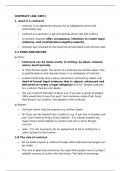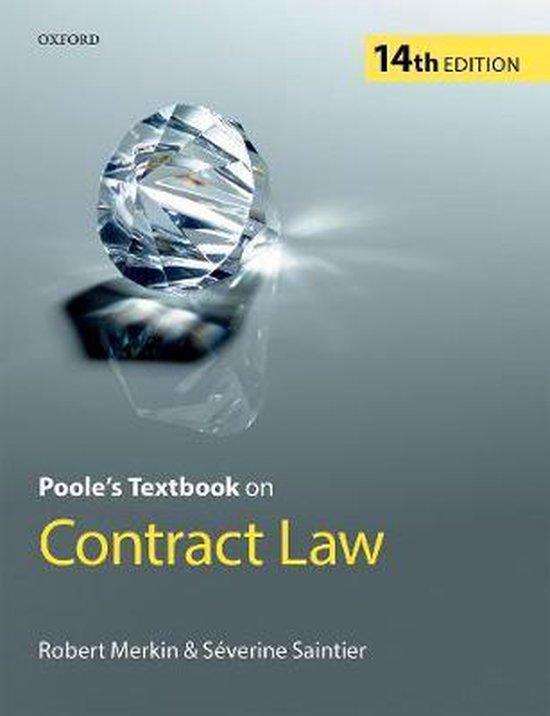CONTRACT LAW- SEM 1
1. what is a contract?
contract is an agreement giving rise to obligations which are
enforced by law
contract is a promise or set of promises which law will enforce
A contract requires offer, acceptance, intention to create legal
relations, and consideration,legality,capacity
contract law is based on the doctrine of precedent and common law.
1.a FORM AND NATURE
⇒ Form:
Contracts can be made orally, in writing, by deed, conduct,
and/or electronically.
In most formal cases, the terms of a contract are written down: this
is proof/evidence and ensures there is no ambiguity of contract.
A deed historically was a fancy document. Contract by deed' is a
deed of formal legal evidence that is signed, witnessed and
delivered to create a legal obligation and for 'Simple contract'
is a contract that are not deeds.
You can contract through conduct e.g. if you ask a group of people
‘Who would like to buy this pen?’ and someone raises their hand,
that person, by conduct, has agreed to the contract.
⇒ Nature:
Contract terms may be express e.g. written down.
Or, they can be implied into a contract e.g. if you live in London and
say "Let's meet at King's Cross Station", it is clearly implied you
mean King's Cross Station in London and not in some foreign
country.
note : It is not necessary for an agreement to be in writing for a
valid contract to be formed.
1.B The role of contract
All societies require a vehicle through which planned exchanges can
be made
The role of planning embraces the need that people have to project
reliable courses of action into the future. The idea of exchange
, includes not only ‘one-off’ contracts, but also long-term business
relationships comprising perhaps many hundreds of individual
contracts; it may also include interpersonal relationships, and even
the individual’s relationship with the state.
There is a relationship of mutual support between societal stability,
the idea of planning, and the existence of exchange. The ability to
plan ahead is an important factor in creating stability, and a stable
society, where exchanges can take place, is an essential ingredient
of reliable planning
the role of the device of ‘contracts’ is to provide for confident
planning of exchanges,
1.C THE ROLE OF CONTRACT LAW
HERE we understand that the role of contract is to provide a promise
between two parties but the role of contract law is to make both the
parties accountable for their promises and make them understand the
consequences off breaking the contract.
the role of ‘contract law’ is to mould those planned exchanges to the
particular society the law serves and to devise applicable principles
that regulate the contractual relationship, e.g. deciding when a
contract comes into existence, when it is deemed to be broken, and
the consequences of such a breach.
1.D The nature of contractual liability
Not all agreements are contracts.
To say that an agreement is ‘legally enforceable’ it should be an
agreement to which the law gives its sanction. if the agreement
disapproves of the law then the agreement cannot be considered legally
enforceable.
ex: if we make a contract regarding drug dealings it wont be considered as
a contract as the law doesnt sanction it.
A contract requires offer, acceptance, intention to create legal
relations, and consideration.
Liability for breach of contract is therefore liability for failure to keep to the
terms of such an agreement.
this means if the contract breaks it is our failure to keep to the
terms and conditions provided in the agreement.
, The subject matter of the contract must be legal- you cannot have a
legally binding contract when the subject of the contract itself is
illegal.
ex : Everett v williams ( 1725 ).
similarly contracts promoting sexual immorality are likewise illegal.
ex: Peace v Brooks ( 1866 )
1.e The essential ingredients of enforceable
⇒ Consideration is needed for an agreement to be legally
enforceable
Consideration has developed from the idea that there must be a mutual
exchange of something of value between the parties
Thus consideration means that before you can enforce any agreement you
must prove that you have promised something of economic value in
return
o Consideration for one promise may therefore be provided by
another promise.
so a contract may be constituted out of nothing more than an exchange of
promises. There are good functional reasons for the enforceability of
promises that have induced the reliance of another
o





